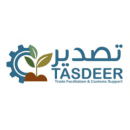Gaza Civil Engineer Consultant
***Only candidates with the relevant right to work will be considered***
KEY INFORMATION
Job Title: Civil Engineer Consultant
Sector: Supporting the Garment and Textile Industry Project in Gaza
Position Type: Consultancy
Duration/Level of Effort: The assignment is expected to start on August 1st, 2022, and to be undertaken part-time over a maximum period of two months exact Level of Effort (LoE) to be determined.
Position Location: Gaza
Reports to: Gaza Lead
BACKGROUND
The Trade Facilitation and Customs Support programme (Tasdeer) is a three-year programme funded by the UK’s Foreign, Commonwealth & Development Office (FCDO) and implemented by Cowater International.
The objective of the Tasdeer programme is to improve the Palestinian private sector’s competitiveness and the PA’s capacity in the fields of trade, customs and import policy regulation and administration. The Tasdeer programme aims to increase sustainable private sector-led economic growth and job creation in the Occupied Palestinian Territories and the PA’s fiscal sustainability while ensuring equitable access to increased trade and improved institutional capacity. Gender Equality and Social Inclusion is a main tool and objective for Tasdeer to ensure the benefits of the programme are equally accessed by the diverse groups of men and women in the supply chain.
Tasdeer is designed to be flexible and adaptive and works politically and technically to make progress across four key interrelated Workstreams:
- Workstream 1: Support to expedite the movement of goods and reduce transaction costs. This workstream aims to develop systemic interventions that will seek to expedite the movement of goods and contribute to impactful reductions in transaction costs for Palestinian imports and exports.
- Workstream 2: Support to improve Palestinian trade-related institutions and business enabling environment. This workstream aims to improve Palestinian trade-related institutions and strengthen the trade operating environment.
- Workstream 3: Support to improve the private sector’s skills and innovation to export and create jobs. This workstream aims to support activities that will help Palestinian firms increase their exports through the application of a market-driven approach. This market-driven approach will identify potential buyers/markets while exploring the linkages between the buyer, the firms, and its suppliers.
- Workstream 4: Support to improve PA’s Customs readiness to assume functions from Israel to collect revenues from trade-related taxes. This workstream aims to provide technical assistance to enhance the capacity of the PA Ministry of Finance Customs Department including the possible transfer of additional custom functions from Israel to the PA and to limit fiscal losses from inefficient clearance mechanism of trade-related taxes between the PA.
The interventions implemented by each workstream are designed to take into consideration the roles and needs of women, youth, and people with disabilities, including those in marginalized areas (i.e., East Jerusalem, seam zone, area C and Gaza), ensuring that all interventions and activities are GESI responsive.
About the Palestinian Federation of Garment and Textile Industry (GTA)
The Garment and Textile Association is a non-governmental professional organization with a mission to lead, develop and advance the garment and textile sector to meet changing market requirements.
To achieve this mission, the GTA has identified the following goals:
- Develop the garment and textile industry through enhancing production capacity while relying on internationally accepted standards.
- Represent and defend the interests of GTA members.
- Support GTA members in developing their products and delivering them to various markets.
- Network with local and international organizations.
- Increase social awareness in supporting local products
Background: Information on the Gaza Textile sector
The garment and textile sector were a major industrial sector in Gaza in the 1990s, with about 900 factories employing 36,000 workers. With the second intifada and the imposed closure, these numbers decreased. By 2006, only 100 factories remained operational, employing 2,000 workers. Easing of the imposed closure in 2014 led to the re-establishment of export activities to Israel and sale of products in the West Bank. This encouraged a steady increase in the number of operating factories. By 2015, the number of exporting factories reached 9, with a total export value of about USD 2,337,368, according to GTA records. Exports from this sector continued to rise, reaching 100 exporting factories in 2020 with a total value of USD 15,193,779. By 2021 this had risen to 226 factories employing 5,500 workers.
Currently, about 35% of textile exports from Gaza are to the Israeli market, while the remaining 65% of products exiting Gaza are sold in the West Bank market. Products sold in the West Bank have greater value-added than those sold in Israel, due to subcontracting arrangements with Israeli businesses. For sale to the West Bank, manufacturers complete the entire production process, from buying the fabric to delivering the finished product. For exports to Israel, manufacturers receive the design and fabric and deliver the end product to Israel.
The garment and textile sector has lost much of its trained workforce due to the closure of Gaza’s borders with Israel in 2006. Loss of business and closure of factories has meant that few workers have been trained since 2006, and the current labour market lacks skills in garment and textile production. This is considered a major impediment to the growth of the sector.
Recent reclamation of export business and markets due to easing of the closure has increased demand for high-skilled workers with special technical skills. The extended period of closure has depleted the pool of skilled workers and made it challenging for garment factories to find needed workers. The historical lack of business also means factories lack resources to invest in skilling new workers.
Although this is a sector that historically employed women and PwD, current participation of women and PwD is estimated at only 5%. Women’s unemployment in Gaza is high, at 64%.
The two primary problems hindering women’s employment in the sector are a lack of required skills and a lack of supportive and appropriate work environments. Businesses are unwilling and often do not have the resources to invest the several months of training required to skill women for production. Consultations with GTA revealed that women also hesitate to work side by side with male workers and to use joint facilities, while businesses remain reluctant to invest in developing specialised and secluded working spaces for women
Objectives of the Assignment:
The “Supporting the Garment and Textile Industry in Gaza "intervention will contribute to upgrading the facilities of the participating factories to become more responsive to the needs of women and accessible to people with disabilities.
Tasdeer is seeking to hire a consultant civil engineer to carry out a technical assessment of the building and facilities of the participating factories from a gender and disability perspective and propose required upgrades to respond to the needs of women and people with disabilities, including but not limited to privacy and accessibility. The consultant will also be required to supervise and monitor the construction works at these factories.
The consultant will be required to conduct field visits to targeted factories to check their technical needs toward creating an inclusive work environment that is responsive to gender and disability at these factories.
Scope of Work:
To achieve the stated assignment objective, the consultant is expected to carry out the following tasks:
- Conduct a desk review of available project documents including:
- Project description document
- Target group criteria
- The initial assessment form of the factories aimed at assessing the extent to which building considerations of each factory include women and people with disabilities.
- Accepted applicants' information (number of women, number of PwDs and disability type) and so on per factory.
- Conduct at least one assessment visit per factory from the list of identified factories that will be provided by GTA to determine the upgrade needs.
- Based on these visits, the consultant will be required to update the initial assessment forms with new findings if any and provide technical specifications and drawings for construction works for the needed upgrades per factory.
- Based on the technical specification, the consultant is expected to prepare the tendering documents and bill of quantities to carry out the construction works.
- Conduct supervision and monitoring visits during the implementation of the required construction works.
- The consultant is expected to provide weekly progress reports to Tasdeer that contains the following:
- Updates against workplan
- Current reporting period activities and achieved results
- Expected activities in the next reporting period
- Implementation risks and mitigation measures
- Recommendations
Deliverables:
- An inception report detailing the consultant methodology for carrying out the assignment and the assignment implementation plan
- An updated initial assessment form per factory.
- Technical Specifications report for each factory
- The tendering documents including the Bill of Quantities and drawings for all required items for selected factories.
Please note that the BoQ should include the quantities and technical specifications for each item and an estimated budget
- An implementation plan to carry out the construction works at the selected factories.
- Supervision and monitoring reports for each factory.
- Work acceptance report confirming the completion of work according to the specifications for each factory.
- A Weekly progress report
- Final Report.
Geographic Coverage and duty station:
The Civil Engineer Consultant will undertake the assignment from his/her own office and is expected to make field visits inside Gaza. The consultant will be expected to maintain regular contact with Tasdeer and the GTA and relevant stakeholders including organizations representing women and PwD’s
جميع الحقوق محفوظة لموقع جوبس.
JOB REQUIREMENTS
Required Expertise, Competencies and Skills
- A bachelor’s degree in civil engineering or any other related field.
- Experience in inclusive construction (making buildings and facilities accessible to PwDs and responsive to the needs of women.
- At least 5-7 years of experience supervising construction works and contractors.
- Experience in assessing buildings and services from a gender and disability perspective.
- Proven competency in writing and speaking English.
- Strong leadership and planning skills
- Strong analytical skills.
APPLICATION PROCESS
Candidates are encouraged to apply as soon as possible to [email protected] no later than Monday, 22nd of August 2022.
Candidates must submit the following to be considered:
- A full CV
- A cover letter (two-page limit, A4) which explains their suitability for the assignment and proposes a draft methodology for conducting the assignment along with their CV.
For your application to be considered, please upload your documents as follows: Candidate Last Name, First Name, date, Title of the Position.
Cowater International is an equal opportunity employer, basing employment on merit and qualifications as they relate to professional experience and position expectations. Cowater does not discriminate against any employee or applicant on the basis of race, religion, sex, gender identity, disability, age, or any other basis protected by law.
We thank all applicants, however only those shortlisted will be contacted.
ABOUT US
With more than 35 years’ experience, Cowater International is Canada’s global leader in management consulting services specializing in international development and has managed the implementation of over 800 projects in more than 80 countries around the globe. We work with governments, partner organizations, communities and civil society to design and implement sustainable solutions that generate lasting social, financial, and environmental impacts. Our adaptive approach to management has led to our award-winning work and recognition as one of Canada’s Best Managed Companies in 2017, 2018, 2019, 2020 and 2021. Headquartered in Ottawa, Canada, Cowater International also has corporate offices in Montreal, Quebec; London, United Kingdom; Nairobi, Kenya; and Brussels, Belgium, in addition to project offices in a wide variety of other locations across Sub-Saharan Africa and Asia.
We thank you for your interest in building a better tomorrow with Cowater International.
For more information about the programme, please visit our website: www.tasdeer.ps










